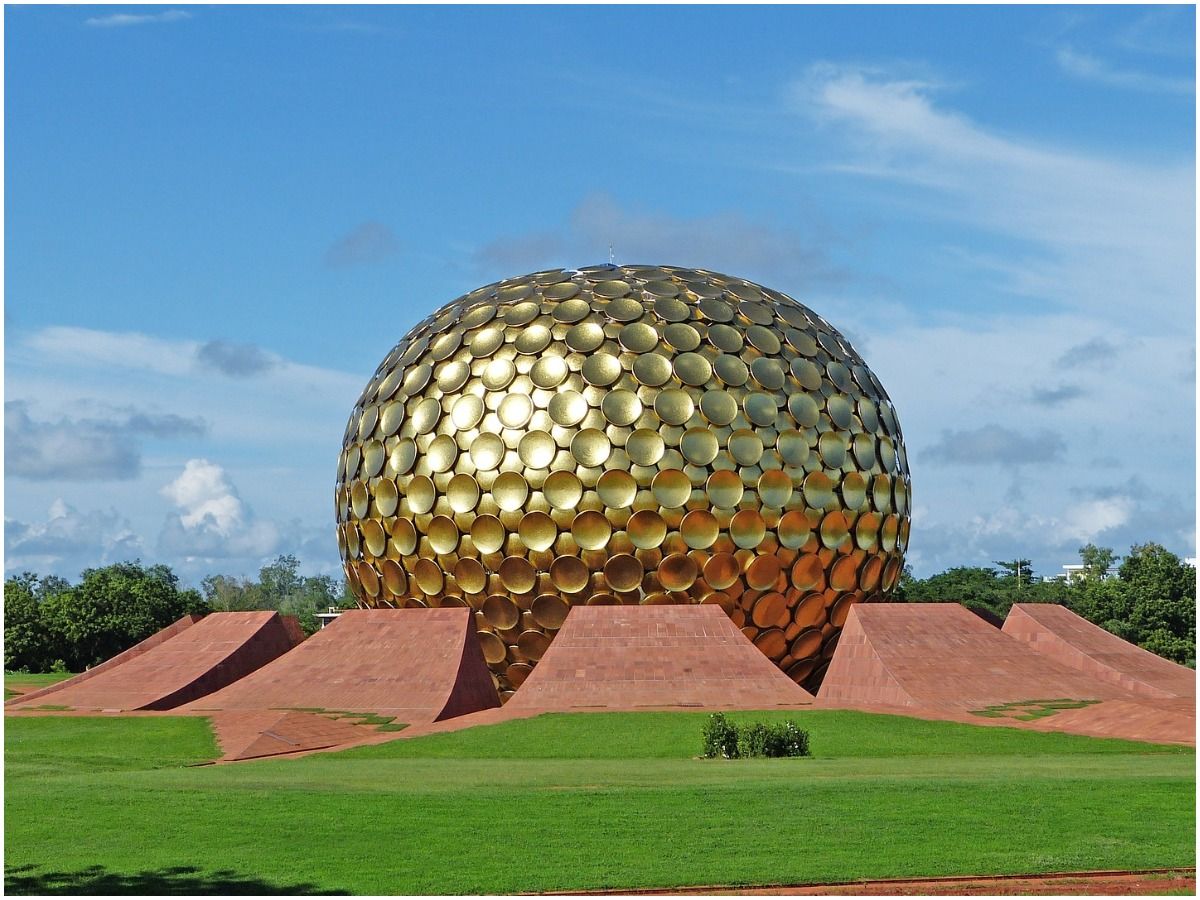Auroville (City of Dawn) was officially founded in 1968 by Mirra Alfassa, a French woman known locally as “the Mother.”
The idea for this experimental town was inspired by her close relationship with the Indian philosopher and yoga guru Sri Aurobindo, an Indian nationalist, yogi, spiritual teacher, philosopher, guru, and poet. He was nominated for the Nobel Peace Prize in 1950 and for the Nobel Prize in Literature in 1943.
Sri Aurobindo’s main literary works are:
- Synthesis of Yoga, which deals with practical guidance to Integral Yoga;
- The Life Divine, which deals with theoretical aspects of Integral Yoga;
- Savitri: A Legend and a Symbol, an epic poem. His works also include philosophy, poetry, translations, and commentaries on the Upanishads, Vedas, and the Bhagavad Gita.
Inauguration of Auroville
The inauguration ceremony, attended by delegates from 124 nations, was held on February 28, 1968.
Handwritten in French by the Mother, its 4-point charter set forth her vision of Integral living:
- Auroville belongs to nobody in particular. Auroville belongs to humanity as a whole. But to live in Auroville, one must be the willing servitor of the Divine Consciousness.
- Auroville will be the place of an unending education, of constant progress, and of a youth that never ages.
- Auroville wants to be the bridge between the past and the future. Taking advantage of all discoveries from within and out, Auroville will boldly spring towards future realizations.
- Auroville will be a site of material and spiritual research for a living embodiment of actual Human Unity.
Spiritual life
Auroville inhabitants believe in the service of truth beyond religious conviction.
There is a temple at the center of the township named “Matrimandir.”
It is of spiritual significance for those who practice Integral yoga (also called supramental yoga) and don’t belong to any specific sect or religion.
This utopia town was not meant to be a place for a new religion or where religion is practiced.
More importantly, spirituality, for them, means something vast and ultimately indefinable, something personal that varies from one individual to the next, something that must always be renewed and re-examined and expanded, as opposed to religion, which often becomes stagnant, calcified, and dogmatic.
ALSO READ: 20 Proven Tips to Improve Your Happiness
Town capacity
The township was originally intended to house 50,000 residents.
In the initial 20 years, only about 400 people from 20 countries resided in the township. In the next 20 years, this number rose to 2,000 individuals from 40 different countries.
As of May 2016, it has 2,487 residents from 49 countries, with 2/3 from India, Germany, and France, and around 5,000 tourists visiting every year. The town community is divided into neighborhoods with English, Tamil, French, and Sanskrit names like Aspiration, Auromodel, Arati, La Ferme, and Isaiambalam.
An Example of Sustainable Living
Auroville is not just a place; it’s a way of life. The city’s commitment to sustainable living is evident in every aspect of its lifestyle. From organic farming to renewable energy sources, Auroville demonstrates how human societies can thrive without depleting the earth’s resources.
The community’s innovative practices serve as a model for sustainable development, inspiring individuals and communities worldwide.
The Cultural Melting Pot
Auroville is a melting pot of cultures, a vibrant tapestry of traditions and customs from around the world. This cultural diversity enriches the Aurovillian experience, fostering a sense of global citizenship among its residents.
The city’s cultural calendar is brimming with events and festivals that celebrate this diversity, creating an environment of mutual learning and respect.
Impact on the World
Auroville’s impact goes beyond its geographical boundaries.
Its unique experiment in human unity has inspired similar initiatives worldwide, challenging conventional notions of nationhood and community.
By demonstrating that a diverse group of people can live together in harmony, Auroville offers hope in a world often divided by differences.
Note
In May 2008, the BBC produced a ten-minute Newsnight film about Auroville, which was aired on BBC Two. It also appeared on BBC On-line. A short version was aired on Radio 4’s “From Our Own Correspondent.”
Image credit – https://pixabay.com/photos/nature-grass-heaven-matrimandir-3300437/
ALSO READ: Emotional Manipulation – How to Deal with a Manipulator
- About the Author
- Latest Posts
Irina is a co-founder and author at AwakeningState.com, an online magazine launched in 2016 that aims to expand consciousness every day. Offering eye-opening articles on a range of topics, Irina strives to provide unique insights into personal growth, covering areas such as spiritual awakening, health, lifestyle, nature, and science.
